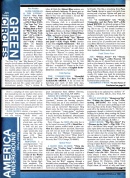Trouser Press, July 1982: Difference between revisions
(+text part 2) |
(+text part 3) |
||
| Line 32: | Line 32: | ||
Nick Lowe was a forces brat. Although born in a village 25 miles west of London, his father's career in the Royal Air Force took young Nick to Cyprus and Jordan before he was carted off to a British boarding school. "I spent most of my life on RAF camps when I was a kid," Lowe reminisces. He pauses. "That doesn't make any sense, does it?" | Nick Lowe was a forces brat. Although born in a village 25 miles west of London, his father's career in the Royal Air Force took young Nick to Cyprus and Jordan before he was carted off to a British boarding school. "I spent most of my life on RAF camps when I was a kid," Lowe reminisces. He pauses. "That doesn't make any sense, does it?" | ||
Lowe enjoyed singing as a child, and his | Lowe enjoyed singing as a child, and his mother taught him to play guitar. "She knew a few chords. We used to sing harmony to Kingston Trio songs, quite harmless stuff." Lowe's first record purchases were equally unprophetic: "Magic Moments" by Perry Como and "Sink the Bismarck" by British cover artist Don Lang. | ||
In common with most of his generation, Lowe was profoundly affected by the double whammy of adolescence and the Beatles (and the groups following in their wake). "I realized I wanted to be in a band when I saw these groups getting fucked so much and taking tons of drugs. I thought it would be a far more exciting way of earning a living than what I had going for me." | |||
Before turning pro Lowe traveled the usual emulation route: "I was in a number of bands that used to imitate West London groups like Creation and the Birds (with Ronnie Wood). They were like the Who: three-pieces with a singer, R&B-based with a bit of Motown but a wild guitar sound. Every group used to do 'Heatwave.' I wanted to be in Creation; we used to do all their numbers. | |||
"I was in some bands where I knew only the first names of the guys in them. In those days it was like, 'Let's form a band. I know a bloke who's got a guitar!' You'd ring a doorbell and say, th, have you got an electric guitar?' Yeah. "You wanta be in a band? I know a bloke who's got an amplifier.' It was just getting people who had some equipment." | |||
One of Lowe's schoolmates was Brinsley Schwarz, who had an electric guitar and was putting a group together. "He'd only let me join if I got a bass. I did a bit of singing—I thought I was Wilson Pickett for a time—but mainly I played bass. No one wanted to play bass because you had to have a group to go along with it. You couldn't just sit at home and get off playing bass." | |||
Lowe's professional fortunes (the term is used loosely) then followed upon Schwarz' for the next decade, first in Kippington Lodge and then the eponymous Brinsley Schwarz. Turning solo artist of necessity after the Brinsleys broke up, Lowe signed aboard Stiff Records in 1976. For once he was in the right place at the right time. As Stiff rode the crest of Britain's new wave, Lowe gained a reputation for his warped pop sensibilities and production knowhow on albums by the Damned and Elvis Costello, among others. | |||
By 1978 Lowe was juggling his solo career with membership in a shadowy organization called Rockpile, including guitarists Dave Edmunds and Billy Bremner and drummer Terry Williams. Due to different record company affiliations, Edmunds and Lowe released their own solo albums and played back-up on each other's, with the other Rockpilers in tow. When the contractual problems were resolved in 1980 Rockpile released a "debut" album and toured the US to much press hoopla. A couple of months later the band broke up. | |||
Lowe is tired of answering Rockpile questions even though the split has never been explained consistently by the parties involved. Warning that he is about to rattle off a stock answer ("but it's the truth"), Lowe proceeds: | |||
"We used to hate rehearsing. It was all simple stuff we used to do, and the air of spontaneity was part of the 'Pile's act: It looked like friends having a good time, which we were. Especially over here, people liked the fact that we were under-rehearsed and kind of scruffy. But whereas a lot of bands who are better rehearsed and have a slicker show can stay together even if they hate each other because there's a dollar bill in it, when we started losing it we really noticed. Maybe we could have done another tour and pulled the wool over people's eyes, but we were all such good mates that we couldn't lie to each other. We'd just done it for too long. | |||
"It happens to all bands. You get carried away with the euphoria of starting a group. Then there comes a time when you get | |||
Revision as of 20:39, 5 August 2017
|






